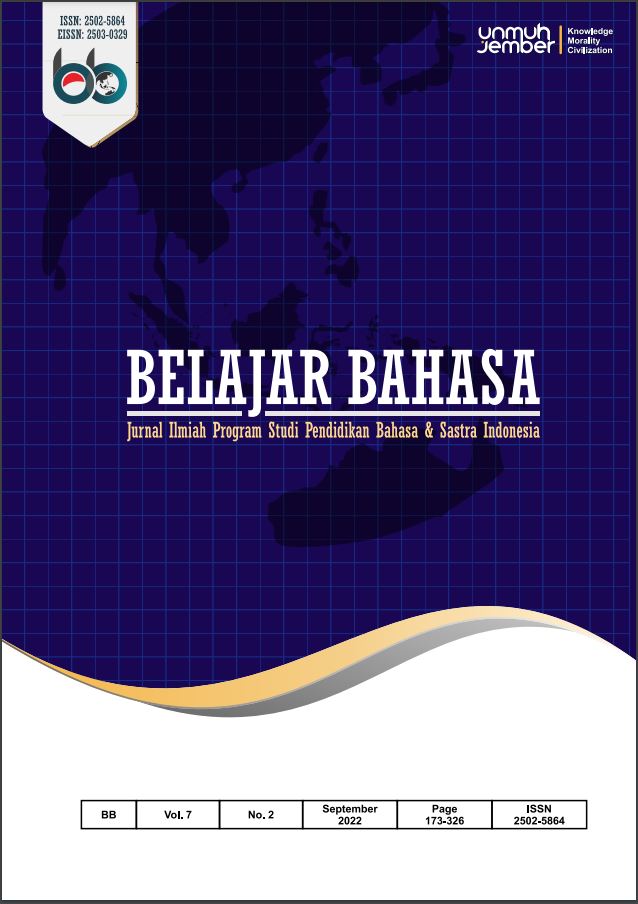Penerapan Model Pembelajaran Role Playing dalam Mata Pelajaran Bahasa Indonesia Kelas 6 SD di Daerah 3T
DOI:
https://doi.org/10.32528/bb.v7i2.38Kata Kunci:
role playing, bahasa Indonesia, Sekolah Dasar, Daerah 3TAbstrak
Penelitian ini membahas permasalahan rendahnya mutu pendidikan di daerah 3T yang disebabkan oleh ketidaksesuaian model pembelajaran dengan kemampuan anak, kondisi lingkungan, fasilitas, media, dan bahan ajar. Maka dari itu, perlu digunakan model pembelajaran role playing khususnya pada mata pelajaran Bahasa Indonesia di tingkat Sekolah Dasar daerah 3T yang mampu menyesuaikan kondisi di daerah 3T. Model role playing bisa memanfaatkan media di lingkungan sekitar yang dapat membantu siswa mengikuti proses belajar di sekolah yang minim sarana dan prasarana. Penelitian ini memiliki tujuan untuk mengetahui kondisi pendidikan di Sekolah Dasar daerah 3T dan penerapan model pembelajaran role playing di daerah 3T dalam materi mata pelajaran Bahasa Indonesia kelas 6 SD. Penelitian ini menggunakan metode deskriptif kualitatif, pengumpulan data melalui teknik wawancara dengan mahasiswa yang menjadi relawan pengajar di daerah 3T dan studi kepustakaan. Hasil dalam penelitian ini menunjukkan bahwa ketiga sekolah yang berada di daerah 3T mempunyai persamaan dan perbedaan masalah yang menjadi faktor penyebab rendahnya kualitas pendidikan Sekolah Dasar di daerah 3T. Faktor-faktor yang telah diidentifikasi yaitu, jarak tempat tinggal guru, kualitas guru, sarana dan prasarana, kemampuan membaca siswa, aliran listrik di sekolah, kesadaran masyarakat, dan bahan ajar. Model role playing dalam mata pelajaran Bahasa Indonesia kelas 6 SD bisa digunakan kepada siswa di daerah 3T. Dalam pelaksanaannya harus dilakukan secara bertahap yang diawali dengan pengenalan mengenai model tersebut kepada siswa.
Referensi
Al-Tabany, T. I. B. (2017). Mendesain Model Pembelajaran Inovatif, Progresif, dan
Konteksual. Jakarta: Prenada Media.
Anwas, O. M. A. O. M. (2013). Peran Teknologi Informasi dan Komunikasi dalam
Implementasi Kurikulum 2013. Jurnal Teknodik, 17(1), 493-504.
Basri, H. (2017). Penerapan Model Pembelajaran Role Playing Untuk Meningkatkan
Hasil Belajar Bahasa Indonesia Siswa Kelas V SDN 032 Kualu Kecamatan
Tambang. Jurnal PAJAR (Pendidikan dan Pengajaran), 1(1), 38-53.
Danga, S. R. (2018). Guru Garis Depan (GGD): Membangun Sumba Melalui
Peningkatan Mutu Pendidikan. SENDIKA: Seminar Pendidikan, 2(1), 234-240.
Khair, U. (2018). Pembelajaran Bahasa Indonesia dan Sastra (BASASTRA) di SD dan
MI. AR-RIAYAH: Jurnal Pendidikan Dasar, 2(1), 81-98.
Kristin, F. (2018). Meta-Analisis Pengaruh Model Pembelajaran Role Playing Terhadap
Hasil Belajar IPS. Refleksi Edukatika: Jurnal Ilmiah Kependidikan, 8(2), 171-176.
Lefudin. (2017). Belajar dan Pembelajaran Dilengkapi dengan Model Pembelajaran,
Strategi Pembelajaran, Pendekatan Pembelajaran dan Metode Pembelajaran. Yogyakarta: Deepublish.
Marlina, M. E. (2013). Kurikulum 2013 yang Berkarakter. JUPIIS, 5(2), 27-38.
Ningrum, D. C. (2020). Penerapan Model Bermain Peran (Role Playing) untuk
Meningkatkan Hasil Belajar Siswa Kelas V SD Negeri 2 Kotagajah Lampung
Tengah. (Skripsi Sarjana, IAIN Metro Lampung).
Prasanti, D. (2018). Penggunaan Media Komunikasi Bagi Remaja Perempuan dalam
Pencarian Informasi Kesehatan. LONTAR: Jurnal Ilmu Komunikasi, 6(1), 15-22.
Rahmawati, A. P. (2022). Sistem Pemerataan Guru Nasional (SPGN) Sebagai Sistem
Penyebaran Guru Untuk Mengatasi Ketimpangan Pendidikan di Daerah 3T. Social, Humanities, and Educational Studies (SHEs): Conference Series, 5(2), 293-300.
Rusman. (2017). Belajar & Belajar: Proses Pendidikan Berorientasi Standar. Jakarta:
Prenada Media.
Rahmi, I., Nurmalina, N., & Fauziddin, M. (2020). Penerapan Model Role Playing Untuk Meningkatkan Minat Belajar Siswa Sekolah Dasar. Journal on Teacher Education, 2(1), 197-206.
Safitri, M. (2015). Pengaruh Metode Role Playing (Bermain Peran) Terhadap Motivasi
Belajar Siswa pada Mata Pelajaran Bahasa Indonesia Kelas V di SDN
Cempaka Putih Tahun Ajaran 2014-2015. (Skripsi Sarjana, Universitas Islam Negeri Syarif Hidayatullah Jakarta).
Samsiyah, N. (2016). Pembelajaran Bahasa Indonesia di SD Kelas Tinggi. Magetan:
CV. Merdeka Grafika.
Syafii, A. (2018). Perluasan dan Pemerataan Akses Kependidikan Daerah 3T (Terdepan,
Terluar, Tertinggal). Dirasat: Jurnal Manajemen dan Pendidikan Islam, 4(2),
-171.
Trianingsih, R. (2016). Pengantar Praktik Mendidik Anak Usia Sekolah Dasar. Al Ibtida: Jurnal Pendidikan Guru MI, 3(2), 197-211.
Zulkarnaen., & Handoyo, A. D. (2019). Faktor-faktor Penyebab Pendidikan Tidak
Merata di Indonesia. Prosiding Seminar Nasional “Menjadi Mahasiswa yang
Unggul di Era Industri 4.0 dan Society 5.0”, hal. 20-24. Yogyakarta: UAD
Press.
Unduhan
Diterbitkan
Cara Mengutip
Terbitan
Bagian
Lisensi
Hak Cipta (c) 2022 BELAJAR BAHASA: Jurnal Ilmiah Program Studi Pendidikan Bahasa dan Sastra Indonesia

Artikel ini berlisensi Creative Commons Attribution 4.0 International License.






